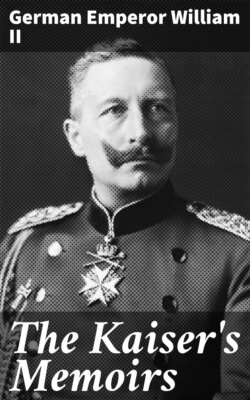Читать книгу The Kaiser's Memoirs - German Emperor William II - Страница 6
На сайте Литреса книга снята с продажи.
THE MAN WITH THE HYENA'S EYES
ОглавлениеTable of Contents
When I had thus become more intimate in the Bismarck circle I heard more open talk about Herr von Holstein. I heard that he was very clever, a good worker, inordinately proud, an odd sort of man, who never showed himself anywhere and had no social relations, full of distrust, much influenced by whims, and, besides all this, a good hater, and, therefore, dangerous. Prince Bismarck called him "The Man with the Hyena's Eyes," and told me that it would be well for me to keep away from him. It was quite apparent that the bitter attitude which the Prince showed later toward Holstein, his former collaborator, was forming even at that time.
The Foreign Office was conducted with the strictest discipline by Count Herbert, whose rudeness toward his employees particularly struck me. The gentlemen there simply flew when they were summoned or dismissed by the Count, so much so that a joking saying arose at the time that "their coat tails stood straight out behind them." The foreign policy was conducted and dictated by Prince Bismarck alone, after consultation with Count Herbert, who passed on the commands of the Chancellor and had them transformed into instructions. Hence the Foreign Office was nothing but an office of the great Chancellor, where work was done according to his directions. Able men, with independent ideas, were not schooled and trained there.
This was in contrast to the General Staff under Moltke. There new officers were carefully developed and trained to independent thinking and action, in accordance with approved principles, and by dint of preserving old traditions and taking into account all that modern times had taught. At the Foreign Office there were only executive instruments of a will, who were not informed as to the important interrelationship of the questions turned over to them for treatment, and could not, therefore, collaborate independently. The Prince loomed up like a huge block of granite in a meadow; were he to be dragged away, what would be found beneath would be mostly worms and dead roots.
I won the confidence of the Prince, who consulted me about many things. For instance, when the Prince brought about the first German colonial acquisitions (Gross and Klein Popo, Togo, etc.), I informed him, at his wish, concerning the state of mind created in the public and the navy by this move, and described to him the enthusiasm with which the German people had hailed the new road. The Prince remarked that the matter hardly deserved this.
Later on I spoke often with the Prince about the colonial question and always found in him the intention to utilize the colonies as commercial objects, or objects for swapping purposes, other than to make them useful to the fatherland or utilize them as sources of raw materials. As was my duty, I called the Prince's attention to the fact that merchants and capitalists were beginning energetically to develop the colonies and that, therefore—as I had learned from Hanseatic circles—they counted upon protection from a navy. For this reason, I pointed out that steps must be taken for getting a fleet constructed in time, in order that German assets in foreign lands should not be without protection; that, since the Prince had unfurled the German flag in foreign parts, and the people stood behind it, there must also be a navy behind it.
